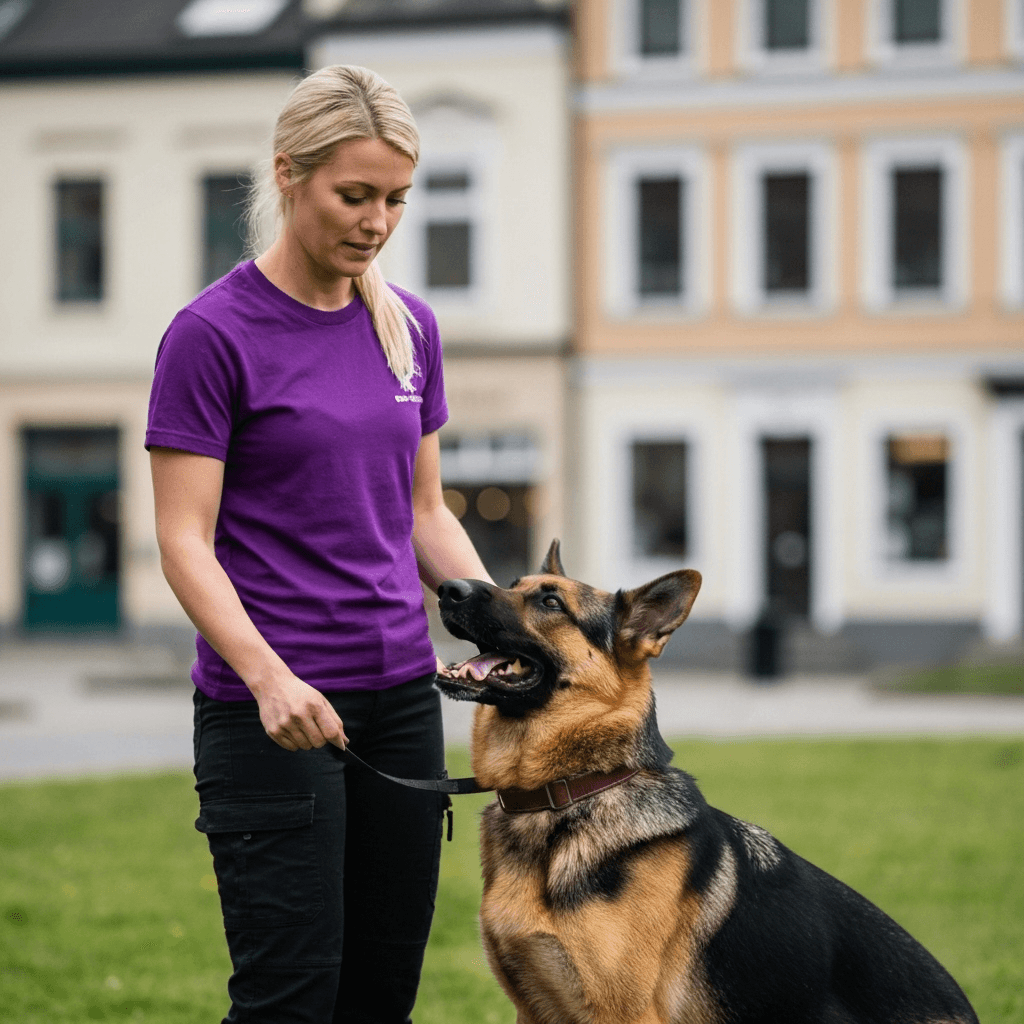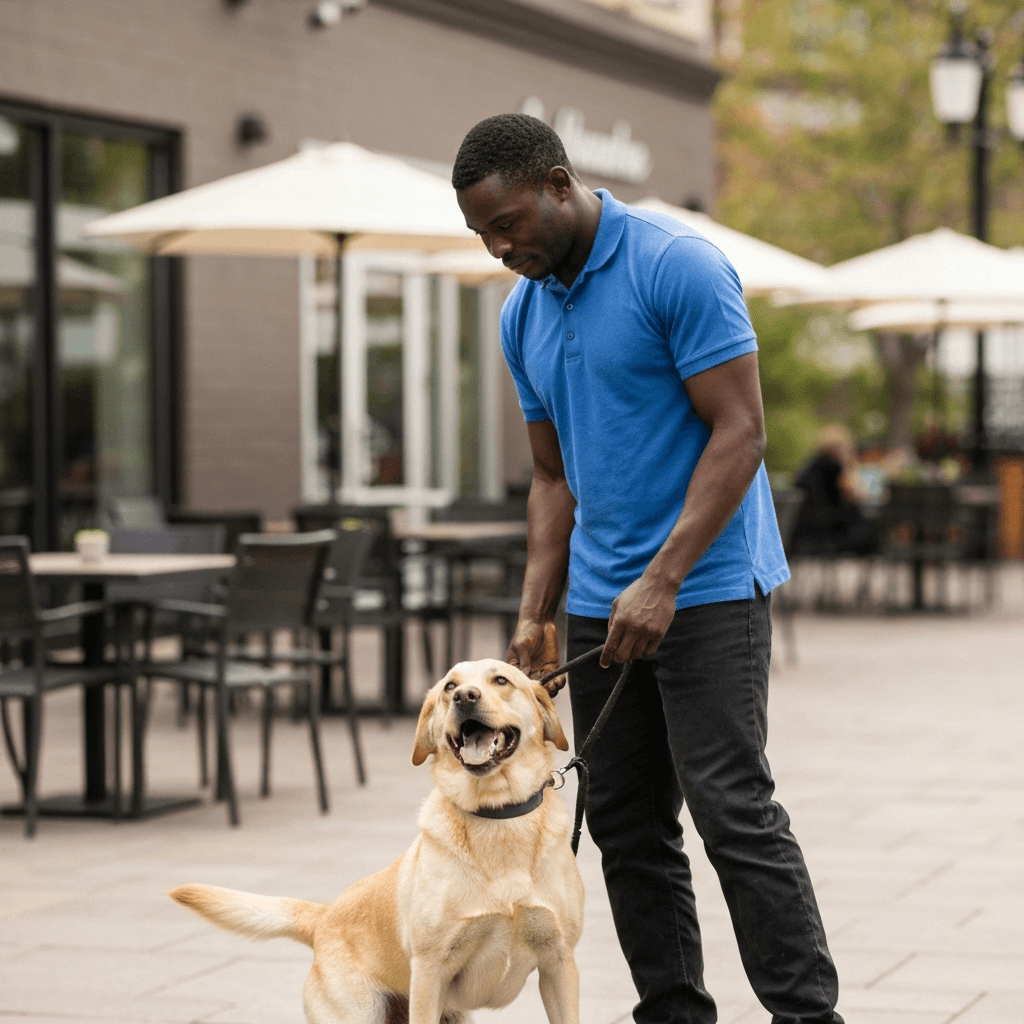Your Complete Guide to Choosing a Dog Trainer in Staten Island
Living with a dog on Staten Island comes with unique challenges. Your pup needs to handle everything from crowded boardwalks to those surprise wild turkeys wandering through neighborhood yards.
From St. George to New Dorp, Great Kills, and Tottenville, finding the right trainer means getting someone who actually understands what life is like here. They should know that weekend parks get packed, apartment lobbies require polite greetings, and your dog will need to stay calm around bike traffic on the South Beach Promenade.
How to Choose the Right Trainer
The best trainers focus on positive reinforcement training and help you tackle real-world situations. You want loose-leash walking along busy streets, calm behavior when deer stroll through your yard, and a dog who won’t drag you toward every interesting smell at Clove Lakes Park.
Start by looking at credentials, which give you a quick way to compare trainers’ experience and education. Check out dog trainer certifications to understand the basics, then ask how they keep their skills current. Good options include KPA-CTP, CPDT-KA, and IAABC-CDBC for serious behavior problems.
If you’re dealing with aggression or complex issues, ask about CBCC-KA or science-based programs like CTC. These show the trainer has put in serious study time and understands how dogs actually learn.
Think about where you want to train too. In-home coaching works great for fixing door manners, elevator behavior, and those first neighborhood walks. Group classes are perfect once your dog can focus around other dogs, especially before you try the off-leash areas at Silver Lake.
Many trainers offer free consultations, which is your chance to see if their approach makes sense for your dog and your goals.
Common Dog Training Methods Explained

Good training builds trust and creates habits that stick, which keeps everyone happier in crowded Staten Island spaces.
Basic obedience covers the essentials like sit, down, stay, place, recall, and leash skills. These basics help your dog navigate boardwalks, handle playground chaos, and walk busy paths without pulling your arm off or jumping on every person you meet.
Puppy training focuses on the big stuff like socialization, potty training, bite inhibition, and crate comfort. Puppies also need calm exposure to all the Staten Island sounds like buses, scooters, and skateboards that might startle them later.
Behavior modification tackles the tougher problems through careful desensitization and counterconditioning. This helps with fear, reactivity, resource guarding, or separation anxiety. For serious cases, good trainers work with your vet to make sure there aren’t underlying health issues.
You might choose private lessons for personalized attention or in-home dog training that addresses problems in your actual living space. Day training can work when your schedule is packed, but if someone suggests board and train, ask exactly how many training sessions your dog gets each day and how you’ll keep up the progress once they come home.
Stay away from trainers who use fear, pain, or dominance methods. Positive approaches are safer, clearer for your dog to understand, and much easier to maintain when you’re dealing with crowds and distractions.
Average Cost of Dog Training in Staten Island (Updated for 2025)
Staten Island prices tend to run a bit lower than Manhattan or Brooklyn, though rates still vary based on the trainer’s experience, travel time, and how complex your goals are.
| Service Type | Average Cost (Staten Island/Richmond County) |
|---|---|
| Puppy classes (4–6 weeks) | $180–$325 total |
| Group obedience classes (4–6 weeks) | $200–$360 total |
| Private lessons (60–90 min) | $120–$200 per session |
| In-home coaching packages (4–6 visits) | $500–$1,000 total |
| Day training (trainer works your dog + handoff) | $650–$1,100 per week |
| Behavior consult for reactivity/anxiety (initial) | $180–$300 |
| Board and train (2–4 weeks) | $2,400–$5,000 total |
Expect to pay extra if you live way out on the South Shore or North Shore. Aggression cases typically cost more, and most trainers require deposits for package deals.
Questions to Ask a Potential Dog Trainer
- What methods do you use, and how do you keep training sessions positive and low-stress?
- Which credentials do you hold, like KPA-CTP or CPDT-KA, and do you have hands-on certifications like CPDT-KSA?
- How will you customize the training for my neighborhood and daily routines here on Staten Island?
- Do you offer in-home visits, group classes, or day training, and which would work best for my goals?
- How will we track progress and know when my dog is ready for bigger challenges like dog runs or busy boardwalks?
- What exactly is included in your price, and are there extra fees for travel or rescheduling?
- Do you carry liability insurance, and can you show me proof?
- For behavior problems, will you work with my veterinarian if needed?
Local Staten Island Rules and Considerations
NYC requires dogs to stay on a leash no longer than 6 feet in public areas. The exceptions are designated off-leash dog runs and specific off-leash hours that NYC Parks posts for certain areas.
Check the NYC Parks dog rules for current details, and always follow posted signs. Your dog needs to stay under control even in off-leash areas.
The city also requires a valid dog license for any dog over 4 months old. You can handle this online through the Health Department at NYC Dog Licenses.
New York State requires current rabies vaccination for all dogs. You can find the requirements at NYS Rabies information.
Don’t forget Staten Island follows the city’s “scoop the poop” rule everywhere. Excessive barking can also lead to neighbor complaints, so a trainer can help with quiet settle routines, window management, and mental enrichment to keep your dog calm and your neighbors happy.
New York doesn’t require special licenses for dog trainers. If a trainer boards dogs overnight, they need the right city permits for animal boarding facilities. Most professional trainers carry liability insurance, and those running paid classes in city parks may need permits too.
Local Staten Island Resources for Dog Owners
- Silver Lake Park Dog Run, Tompkinsville: Separate fenced areas for small and large dogs; good for practicing recall during quieter morning hours.
- Clove Lakes Park Dog Run, Sunnyside: Shaded run with nearby trails; perfect for working on calm entrances and exits.
- Wolfe’s Pond Park Dog Run, Prince’s Bay: Large, spacious run with walking paths nearby for leashed training practice.
- Midland Beach and South Beach Promenade: Great spots for loose-leash walking; just remember seasonal beach rules for dogs.
- Staten Island Greenbelt trails (leashed dogs only): Perfect for building focus around wildlife and mountain bikers; keep that 6-foot leash handy.

Common Questions
How much does in-home dog training cost?
Most Staten Island trainers charge $120–$200 per session for in-home visits. Package deals usually bring down the per-session cost, while serious behavior issues tend to cost more due to the extra planning involved.
Is in-home dog training worth it?
Absolutely, especially for problems that happen at home like door jumping, yard barking, or hallway reactivity. You get to work on issues where they actually occur, then gradually add neighborhood distractions as your dog improves.
Can you pay someone to house train your dog?
Many trainers offer puppy programs that include potty training along with crate routines and schedule planning. Day training can speed things up since the trainer works with your dog during the day, then teaches you how to maintain the routine.
What is the 3-3-3 rule for dog training?
This guideline suggests dogs need about 3 days to decompress in a new situation, 3 weeks to learn new routines, and 3 months to fully settle in. Training tends to work better when your expectations match this natural timeline.
How long will it take to reach my training goals?
Most puppies and easy-going adult dogs show solid progress in 4–8 weeks with daily practice between sessions. Fear-based issues, reactivity, or aggression typically take several months of structured behavior modification work.
What should I bring to group classes?
Pack a flat collar or harness, 6-foot leash, high-value treats your dog loves, water, and vaccination records if the trainer requests them. Skip retractable leashes since they’re harder to control in group settings.
What’s the leash law in Staten Island?
NYC requires dogs to be on a leash 6 feet or shorter in all public areas. The only exceptions are inside designated dog runs and during specific off-leash hours that NYC Parks posts for certain areas.
Do I need a dog license in Staten Island?
Yes, NYC requires a dog license for any dog over 4 months old. You can apply or renew online through the Health Department’s system at NYC Dog Licenses.
What shots does my dog need in New York?
Rabies vaccination is required throughout New York State. Your vet will typically recommend core vaccines like distemper-parvo and may suggest lifestyle vaccines like bordetella based on where you take your dog.
Are dog trainers required to be licensed in Staten Island?
No, New York doesn’t require special licenses for dog trainers. If a trainer also boards dogs overnight, they need appropriate city permits for animal boarding facilities and should carry liability insurance.
Where can I practice off-leash recall?
Stick to fenced dog runs like Silver Lake, Clove Lakes, or Wolfe’s Pond for safety. Try visiting during quieter times so your dog can focus without getting overwhelmed by crowds and activity.
Which dog parks allow training around Staten Island?
All the main dog runs (Silver Lake Park, Clove Lakes Park, and Wolfe’s Pond Park) allow off-leash activity within their fenced areas. Keep training sessions short and positive, and always follow posted park rules.
What beaches and trails allow dogs for training?
Most Staten Island Greenbelt trails welcome leashed dogs, making them great for distraction training. NYC beaches generally allow leashed dogs only during off-season months, not during summer swimming season, so check posted signs before heading out.
Do trainers need insurance to work in NYC parks?
Trainers running paid group classes in parks typically need permits and liability insurance. Ask your trainer how they handle permits, insurance requirements, and any group size limits that might apply.
Finding the right trainer takes some research, but it’s worth the effort. Good training using humane methods and consistent practice around Staten Island’s parks and neighborhoods will help your dog become the calm, confident companion you want. If credentials matter to you, spend some time learning about dog trainer certifications like KPA-CTP, CPDT-KA, or advanced options such as IAABC-CDBC and CTC before you make your final choice.
